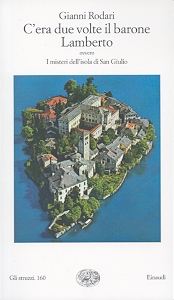Gianni Rodari
Gianni Rodari | |
|---|---|
Hans Christian Andersen Medal (1970) |
Giovanni Francesco "Gianni" Rodari (Italian pronunciation:
Biography
Rodari was born in
During World War II, Rodari had a deferment from the army due to his ill health. Due to his precarious financial situation, he applied for work at the Casa del Fascio and was forced to join the National Fascist Party. Traumatized by the loss of his two best friends and his favourite brother Cesare's incarceration in a German concentration camp, Rodari joined the Italian Communist Party in 1944 and participated in the Italian resistance movement.
In 1948, as a journalist for the Communist periodical L'Unità,[4] he began writing books for children. In 1950, the Party installed him as editor of the new weekly children's magazine Il Pioniere in Rome.[4] In 1951, Rodari published his first books, Il Libro delle Filastrocche and Il Romanzo di Cipollino.
In 1952, he travelled for the first time to the Soviet Union, which he frequented thereafter. In 1953, he married Maria Teresa Feretti, who four years later gave birth to their daughter, Paola. In 1957, Rodari passed the exam to become a professional journalist.
Rodari spent the years 1966–1969 working intensively on collaborative projects with children. In 1970 he received the
In 1979, after another trip to the Soviet Union, his health, never very robust, declined and his productivity diminished. He died in Rome, following a surgical operation, in April 1980.[5]

Works
He is perhaps best known for developing the story of Cipollino. The story of Cipollino was popular enough to have a ballet staged in the Soviet Union in 1973, composed by Karen Khachaturian and choreographed by Henrich Mayorov. Cipollino, or Little Onion, fights the unjust treatment of his fellow vegetable townfolk by the fruit royalty (Prince Lemon and the overly proud Tomato) in the garden kingdom. The main theme is the "struggle of the underclass and the powerful, good versus evil" and the importance of friendship in the face of difficulties.[6] Rodari's works have continued to be published and re-illustrated by other authors after his death, including Nicoletta Costa.
- Il libro delle filastrocche (“The Book of Children's Poems”, 1950)
- Il romanzo di Cipollino (“The Adventures of Cipollino, the Little Onion”, 1951)
- La Freccia Azzurra (“The Blue Arrow”, 1954)
- Gelsomino nel paese dei bugiardi (“Gelsomino in the Country of Liars”, 1958)
- Filastrocche in cielo e in terra (“Nursery Rhymes in the Sky and on Earth”, 1960)
- Favole al telefono (“Telephone Tales”, 1962)
- Gip nel televisore (“Gip in the Television”, 1962)
- La freccia azzurra (“The Blue Arrow”, 1964)
- La torta in cielo (“The Cake in the Sky”, 1966)
- La grammatica della fantasia (“The Grammar of Fantasy”, 1974)
- C'era due volte il barone Lamberto ovvero I misteri dell'isola di San Giulio (Twice Upon a Time there was a Baron called Lamberto or The Mysteries of the ISBN 88-06-01578-8)
- Novelle fatte a macchina (“Stories written on a typewriter”)
- Atalanta
- Piccoli Vagabondi
Tribute
On 23 October 2020 Google celebrated his 100th birthday with a Google Doodle.[7]
See also
- 2703 Rodari
References
- ^ a b "Hans Christian Andersen Awards". International Board on Books for Young People (IBBY). Retrieved 2013-08-01.
- ^ a b
"Gianni Rodari" (pp. 42–43, by Eva Glistrup).
The Hans Christian Andersen Awards, 1956–2002. IBBY. Gyldendal. 2002. Hosted by Austrian Literature Online. Retrieved 2013-08-01. - ^ Fairy Tales translated
- ^ ProQuest 230779350.
- ^ Marcello Argilli, Gianni Rodari: una biografia, Einaudi, 1990, p. 64.
- ^ Ballet Theatre of Lancaster Archived 2009-03-12 at the Wayback Machine
- ^ "Gianni Rodari's 100th Birthday". Google. 23 October 2020.
Further reading
- (In Italian) Argilli, Marcello, del Cornò, Lucio, and de Luca, Carmine (eds.), Le provocazioni della fantasia. Gianni Rodari scrittore e educatore (1993).
- (In Italian) Bini, G. (ed.), Leggere Rodari (1981).
- (In Italian) Boero, Pino, Una storia, tante storie: guida all'opera di Gianni Rodari (1992) ISBN 8866565822
- (In Italian) Cambi, Franco, Collodi, De Amicis, Rodari : tre immagini d'infanzia. Dedalo, 1985. ISBN 8822045114
- (In Italian) Gianni Rodari: la letteratura per l’infanzia, a cura di Enzo Catarsi. Pisa: Edizioni del Cerro, 2002
- Petrini, Enzo, Argilli, Marcello, and Bonardi, Carlo (eds.), Gianni Rodari Giunti-Marzocco, 1981.
- Rodari, Gianni, The Grammar of Fantasy, trans. with intro. Jack Zipes (1996).ISBN 1592703054
- (In Italian) Se la fantasia cavalca con la ragione: prolungamenti degli itinerari suggeriti dall'opera di Gianni Rodari : convegno nel decennale della Grammatica della fantasia, organizzato da Comune e Provincia di Reggio Emilia, Regione Emilia Romagna, ARCI, Reggio Emilia, 10-12 novembre 1982 ; a cura di Carmine de Luca. Bergamo: Juvenilia, c1983
- (In Italian) Zagni, Patrizia, Gianni Rodari. Firenze: La Nuova Italia, 1975
